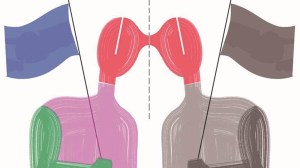The Ludhiana court has directed social media platforms, including X, Facebook, YouTube, and various news portals, to remove an audio clip where a senior police officer is purportedly heard negotiating financial terms for sexual services with an unidentified woman.
While ordering immediate removal of the content, the court of Judicial Magistrate First Class Vibha Rana noted that the audio may be “Artificial Intelligence (AI)-generated.” It stated that “no person, group, page, handler, or digital entity shall post, repost, tag, upload, or circulate the impugned content or any content of a similar nature.”

The order came on Wednesday on a petition filed by Devinder Singh Kalra, who described himself as a “social activist and law-abiding citizen”. Kalra had filed the application under Rule 3(1)(d) and 3(2)(b) of the Information Technology Act and Section 90 of the Bharatiya Nagarik Suraksha Sanhita, seeking the “removal of defamatory and unlawful content from social media platforms.”
Story continues below this ad
In his petition, Kalra claimed: “The said content allegedly contains AI-generated, impersonated/voice-cloned audio and visuals targeting law enforcement personnel and portraying defamatory material that is not only misleading but also capable of disturbing public order and undermining the institutional integrity of the police force.”
He further argued that the content was “defamatory and misleading,” involved impersonation of a senior police officer “demanding sexual favours,” and that the clip sounded “highly suspicious in nature due to its mechanical tone, unnatural modulation, etc.”
The court, calling the petitioner’s submissions “well-founded and persuasive,” directed platforms like X, Facebook, YouTube, and other independent digital channels to remove the content immediately.
“The manner in which the impugned audio has been presented across viral videos—without any disclosure of source, authentication, or official verification—combined with its uniform pitch, mechanical tone, and lack of natural conversational cadence, supports the applicant’s claim that the audio is likely to be AI-generated synthetic speech,” the order dated April 7 stated. A copy of the order was made available online on Wednesday.
Story continues below this ad
“This Court is cognizant of the growing concern around the misuse of publicly available artificial intelligence tools, such as Resemble.AI, ElevenLabs, and Descript, which can clone human voices with high precision. The features of the impugned audio bear typical signs of voice synthesis: absence of tonal variation, disconnected phrasing, and speech uniformity inconsistent with natural human interaction,” it read.
The court further held that such content does not fall under “protected speech or public interest journalism.” It added: “This portrayal, amplified through commentary and widespread circulation, amounts to targeted online character assassination. Further, upon perusal of the submitted YouTube links and associated metadata, it appears that some of the channels/accounts involved in circulating the impugned content are hosted or registered outside India… This unchecked dissemination of unauthentic, manipulated, or defamatory content through extraterritorial sources can cause public unrest…”
Stating that such circulation constitutes “misuse of digital platforms for defamation, impersonation, and malicious targeting,” the court said there was “reasonable ground” to pass an injunctive order under Rule 3 of the Information Technology (Intermediary Guidelines and Digital Media Ethics Code) Rules, 2021.
Meta platforms, including Facebook and Instagram, have been ordered to “remove and disable access to all the impugned videos and posts” and ensure that “no re-upload, repost, tag, or circulation of the same content or any similar content is permitted on their platforms.”
Story continues below this ad
YouTube has been directed “to immediately remove, block, and disable public access to the impugned videos listed herein” and to ensure that “no video of the same or similar nature—whether in the form of a re-upload, edited form, shorts, or as a reaction—is allowed to be published.”
X (formerly Twitter) has been instructed to “remove the impugned tweets and videos from its platform.”
The court further directed that “no person, group, page, handler, or digital entity” shall “post, repost, tag, upload, or circulate the impugned content concerning the same individual(s) or institution(s).
The court also appointed the in-charge of the Punjab Police State Cyber Crime Division, Mohali, to ensure immediate compliance with the order.









